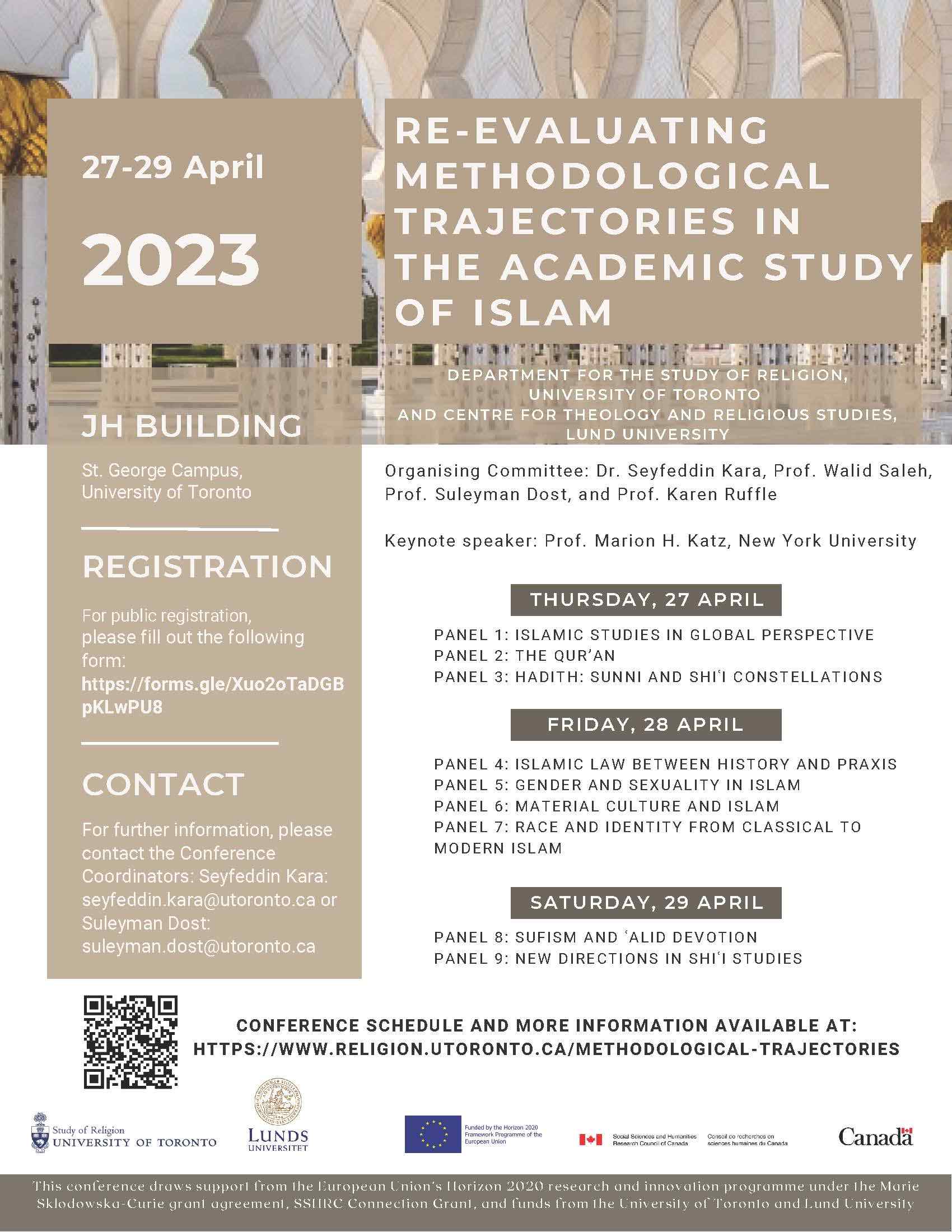Re-evaluating Methodological Trajectories in the Academic Study of Islam Conference
When and Where
Speakers
Description
This conference is jointly hosted by the Department for the Study of Religion, the University of Toronto and the Centre for Theology and Religious Studies, Lund University. It is a three-day conference and will take place between 27-29th of April 2023. It is primarily funded by the European Union’s Horizon 2020 research and innovation programme under the Marie Sklodowska-Curie grant agreement, SSHRC Connection Grant and funds from the University of Toronto and Lund University. Please see below for detailed information about the conference and its theme.
It brings together diverse and exciting voices in the field of Islamic studies to challenge existing disciplinary boundaries and traditional conventions of the field. We approach Islamic studies as an integrative field, where the Muslim tradition is taken as a whole in its complexity, be it confessional, material or historical. Therefore, the conference does not privilege any approach but brings scholars from various fields and confessional specialities. We are particularly attuned to creative methods and unexplored sources investigating new questions within multiple frameworks. We are hoping to have a fresh conversation to catch up with new, invigorating scholarship in the field and take stock of the new realities imposed on us in the last two dramatic years.
On the face of it, this would seem to be a rather natural approach if only because of Sunnism's religious, social and political achievements. Yet, given the global nature of the academic inquiry today, and the availability of a host of heretofore unknown and therefore unstudied sources, many scholars have questioned this tendency towards Sunni bias, pointing to the very fertile and rich dimensions of the Shiʿi tradition (Twelver, Ismaʿili, and Zaydi), and other historically significant expressions of Islam, such as Ibadism. Yet this broader perspective on the Islamic tradition’s key and underrepresented sources also runs the risk of creating an academic silo in which, for example, such a major dimension of Islam as Shiʿism becomes a subfield of Islamic studies rather than actually breaking into the mainstream of Islamic studies per se.
In the face of such a challenge, there is also a unique third position, which entails a more holistic approach to studying Islam and Muslim sources. The point of emphasis here is to not see Sunni sources as determinative of the categories of Islamic studies or other important Muslim traditions such as the Shiʿi as a distinctive and therefore confined sub-unit of Islamic studies, but, rather, both Sunni and Shiʿi approaches (along with Ibadism) as all informative, and thus (to the extent possible) normative expressions of the Islamic tradition’s vast pre-modern traditions. Approaching the Islamic tradition in this manner is sure to yield promising results for the field, especially for the scholars of the formative period of Islam whose research has often been adversely affected due to scarcity of sources.
This conference aims to bring a more holistic study of the formative period of Islam front and centre. “Holistic study” refers to the comprehension of various manifestations of Islam as intimately interconnected and explicable only by reference to the whole. In this sense, the conference wants to illustrate, among other things, how one should not look at Islamic studies in Sunni and Shiʿi (along with Ibadism) contexts separately but see their connections, interaction and influence.
Selected conference papers will be published as an edited volume (details TBD). Please contact the Conference Coordinators, Seyfeddin Kara: seyfeddin.kara@utoronto.ca or Suleyman Dost: suleyman.dost@utoronto.ca for further information.
For public registration, please fill out the following form: https://forms.gle/Xuo2oTaDGBpKLwPU8
Funding: This project is primarily funded by the European Union’s Horizon 2020 research and innovation programme under the Marie Sklodowska-Curie grant agreement No: 101022180 — TIQ.
Panels
Panel 1: Islamic Studies in Global Perspective
Chair: Sajjad Rizvi, University of Exeter
Chiara Formichi, Cornell University, Ithaca NY
Brannon Ingram, Northwestern University, Chicago IL
Youssef Carter, UNC Chapel Hill
Jazmin Graves, UNC Greensboro
Panel 2: The Qur’an
Chair: Walid Saleh, U of T
Devin Stewart, Emory University
Asma Hilali, Université de Lille
Tahseen Thaver, Princeton University
Marijn Van Putten, Leiden University
Panel 3: Hadith: Sunni and Shiʿi Constellations
Chair: Arafat A. Razzaque, U of T
Andreas Goerke, University of Edinburgh
Ash Geissinger, Carleton University, Ottawa, ON
Ed Hayes, Radboud University, Nijmegen
Seyfeddin Kara, U of T and Lund University
Panel 4: Islamic Law Between History and Praxis
Chair: Mohammad Fadel, U of T
Ersilia Francesca, Napoli University
Josie Hendrickson, University of Alberta
Aun Hasan Ali, University of Colorado Boulder
Panel 5: Gender and Sexuality in Islam
Chair: Ari Schriber, U of T
Serena Tolino, University of Bern
Yafa Shanneik, Lund University
Shenila Khoja-Moolji, Georgetown University
Arsalan Khan, Union College
Panel 6: Material Culture and Islam
Chair: Suleyman Dost, U of T
Richard McGregor, Vanderbilt University
Teren Sevea, Harvard University
Eleonore Cellard, Collège de France
Adam Bursi, Utrecht University
Panel 7: Race and Identity from Classical to Modern Islam
Chair: Natalie Rothman, U of T
Najam Haider, Barnard College Columbia University
Toby Matthiesen, Marie-Curie Global Fellow, Ca’ Foscari and Stanford University, incoming (from fall 2023) Senior Lecturer in Global Religious Studies at the University of Bristol
Katherine Merriman, University of Detroit-Mercy
Panel 8: Sufism and ʿAlid Devotion
Chair: Shuaib Ally, U of T
Cyrus Zargar, University of Central Florida
Ayesha Irani, University of Massachusetts Boston
Nebil Husayn, University of Miami
Vinay Khetia, McMaster University
Panel 9: New Directions in Shiʿi Studies
Chair: Karen Ruffle, U of T
Tahera Qutbuddin, Chicago University
Deborah Tor, University of Notre Dame
Oliver Scharbrodt, Lund University
Olly Akkermann, Freie Universität Berlin
CONFERENCE SCHEDULE
April 27- Thursday
9:00: Welcome Speech
9:15-11:00: Panel 1
11:00-11:15: Coffee Break
11:15-13:00: Panel 2
13:00-14:00: Lunch
14:00-15:45: Panel 3
17:00-18:30: Keynote
19:00: Dinner
April 28, Friday:
9:00-10:45: Panel 4
10:45-11:00: Coffee Break
11:00-12:45: Panel 5
12:45-14:00: Lunch
14:00-15:45: Panel 6
15:45-16:00: Coffee Break
16:00-17:45: Panel 7
April 29, Saturday:
9:00-10:45: Panel 8
10:45-11:00: Coffee Break
11:00-12:45: Panel 9
1:00-1:45: Concluding Session



